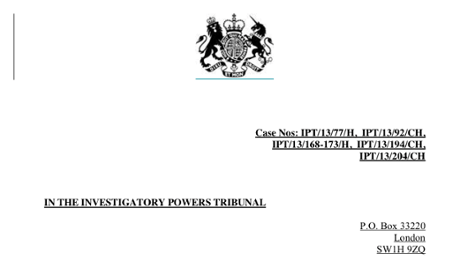GCHQ's Surveillance of Rights Groups is Illegal

GCHQ’s covert surveillance of two international human rights groups was illegal, the judicial tribunal responsible for handling complaints against the intelligence services has ruled. The UK’s government monitoring agency retained emails for longer than it should have and violated its own internal procedures, according to a judgment by the investigatory powers tribunal (IPT). But it ruled that the initial interception was lawful in both cases.
The IPT upheld complaints by the Egyptian Initiative for Personal Rights and the South African non-profit Legal Resources Centre that their communications had been illegally retained and examined. The tribunal made “no determination” on claims brought other NGOs, including Amnesty International, Liberty and Privacy International, implying that their emails and phone calls were not intercepted or that they were intercepted but by legal means.
The IPT ruling said: “We are concerned that steps should be taken to ensure that neither of the breaches of procedure referred to in this determination occurs again. For the avoidance of doubt, the tribunal makes it clear that it will be making a closed report to the prime minister.”
It is the first time that a court has revealed that British intelligence agencies have spied on foreign human rights groups.
The case against the monitoring agency follows revelations by the US whistleblower Edward Snowden.
In relation to the Egyptian Initiative for Personal Rights, the IPT found that “email communications ... were lawfully and proportionately intercepted and accessed ... However, the time limit for retention permitted under the internal policies of GCHQ, the intercepting agency, was overlooked in regard to the product of that interception, such that it was retained for materially longer than permitted under those policies.”
In respect of the Legal Resources Centre, the IPT said: “Communications from an [associated] email address ... were intercepted and selected for examination ... The tribunal is satisfied that the interception was lawful and proportionate and that the selection for examination was proportionate, but that the procedure laid down by GCHQ’s internal policies for selection of the communications for examination was in error not followed in this case.”
A government spokesperson said: “We welcome the IPT’s confirmation that any interception by GCHQ in these cases was undertaken lawfully and proportionately, and that where breaches of policies occurred they were not sufficiently serious to warrant any compensation to be paid to the bodies involved.
Guardian: http://bit.ly/1U0rQIq


























